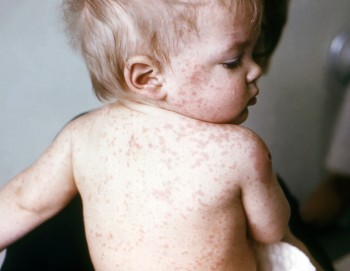The United States is experiencing a multi-state measles outbreak that started in California in December 2014. As of Jan. 28, 2015, there were 51 confirmed cases, including one case in Colorado.
The measles was declared eliminated in the U.S. in 2000 due to a high population immunity to the disease resulting from a very effective vaccine. Measles remains endemic in many parts of the world and outbreaks can occur when unvaccinated groups are exposed to imported measles virus. In 2014, prior to the California outbreak, the Centers for Disease Control and Prevention reported unusually high number of reported measles cases. In September 2014, there were more than 120 cases, the highest number reported since 1996. Many of the cases were linked to travel to the Philippines during a large measles outbreak in that country.
Measles is a highly contagious, viral illness. Symptoms generally appear seven to 14 days after a person is infected and begin with fever, cough, runny nose and conjunctivitis (red, water eyes). A rash appears within five days after symptoms start. Infection can cause pneumonia, encephalitis and death. Infection can be prevented with the MMR (measles, mumps and rubella) vaccine.
The CDC recommends:
- All children should get two doses of MMR vaccine; the first dose at 12 to 15 months old and the second dose at 4 to 6 years old.
- If children will be travelling internationally:
Infants 6 through 11 months old should receive one dose of MMR vaccine; infants who get one dose before their first birthday should get two more doses (one dose at 12 through 15 months and another dose at least 28 days later).
Children 12 months of age and older should receive two doses of MMR vaccine, separated by at least 28 days. - Adults born before 1957 are generally considered immune to measles and mumps.
- Adults born in 1957 or later who do not have evidence of immunity (documentation of adequate vaccination or history of infection) should have one or more doses of the MMR vaccine, depending on their risk. Teens and adults who are in a post-secondary school, work in a health care facility or are planning international travel are considered at a greater risk of exposure and should receive two doses of MMR.
- Adults and children can get a second dose 28 days or more following the first dose.
Parents in the process of adopting children from other countries should be aware of measles risk. Children who haven’t had MMR vaccine could be incubating measles at the time of adoption, especially if they were in an orphanage environment. It’s important to connect with a primary care provider and closely monitor the child’s health upon coming back to the U.S.
CLICK HERE for more information about measles vaccination. The MMR vaccine is available at the Northwest Colorado Visiting Nurse Association. For more information, call 970-879-1632 in Steamboat Springs or 970-824-8233 in Craig.
